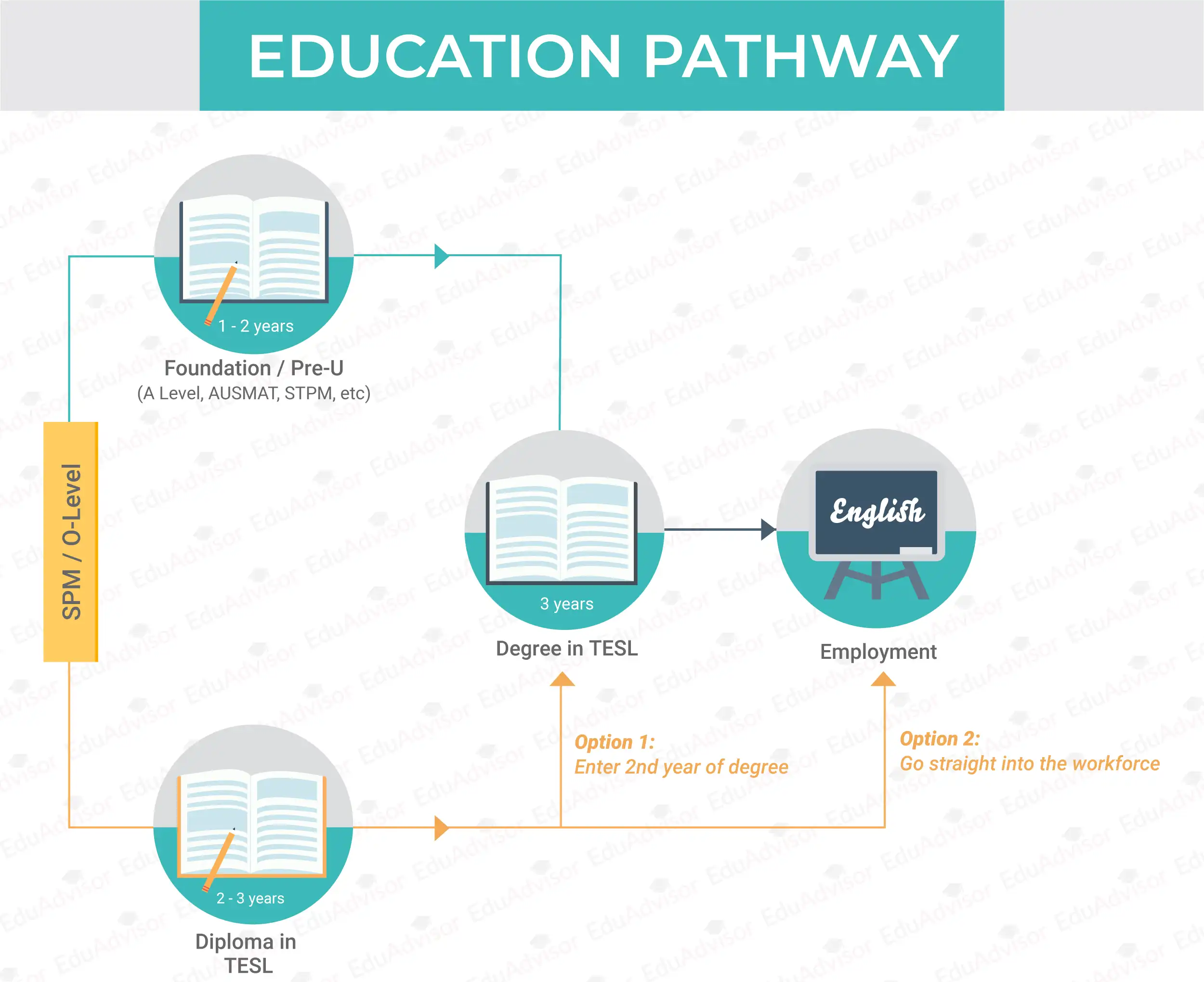The Complete Guide to Studying TESL in Malaysia
How can a TESL degree lead to a career in teaching? Discover TESL, including its entry requirements, job propects and best universities, in this guide.

Are you passionate about teaching? Have you always wanted to teach English as a second language, not just in Malaysia but also in other parts of the world?
If this sounds like fun, studying a Degree in TESL may be the right fit for you. In this guide, you'll find out everything you need to know about studying TESL, including learning what is TESL and discovering the ideal TESL career path in Malaysia.
Ready to begin your TESL journey? Read on for more details!

City University
Bachelor of Education (Hons) in TESL
✓Aims to produce eloquent professionals in English who are well-versed with issues in TESL
#1. The Basics of TESL
a) What is TESL?

TESL is an acronym for Teaching English as a Second Language. It relates to teaching English in countries where English is widely used but is not the first language. Take Malaysia for example; Bahasa Melayu is the national language but English is frequently used during everyday interactions and business meetings. Other countries where TESL would apply to include the Philippines, India, Poland and France.
TESL could also be in settings where non-native English speakers are trying to improve their proficiency in English in English-speaking countries. For example, this could mean teaching English to foreign students who are living in Australia or the United States.
In Malaysia, studying a Degree in TESL will equip you with sound knowledge of teaching phonetics, grammar and literature. At the same time, you will learn how to design and deliver an English language curriculum effectively through various teaching styles and strategies. The knowledge and skills gained will grant you the eligibility to teach English as a second language in both private and government schools.
b) TESL, TESOL and TEFL: What's the Difference?

If you are looking to get qualified as an English teacher, you may be confused by the many acronyms surrounding the field. TESL, TESOL and TEFL all describe the field of teaching English to speakers whose first language is not English. However, there are some differences between them.
TESL, or Teaching English as a Second Language, is generally for teaching learners in countries where English is not the first language but is still widely used (e.g. Malaysia). It could also apply to teaching foreign learners in countries where English is the first language.
TEFL, or Teaching English as a Foreign Language, on the other hand, focuses on teaching English in countries where English is not the primary language nor is it commonly used. These learners often do not have many opportunities for language immersion in their home country. Such countries include Japan, Korea and Brazil.
Finally, TESOL, or Teaching English to Speakers of Other Languages, is a broader term that covers both TEFL and TESL. A TESOL qualification may provide you with more flexibility since it allows you to teach English in both English and non-English speaking countries.
Regardless of the name of the qualification, it is important to note that it may vary from one university to another. One university’s TESOL could be another university’s TESL. It pays to do your research by understanding the curriculum and the subjects offered, speaking to the lecturers and finding out where their graduates end up working in.

#2. Studying TESL
a) Entry Requirements & Qualifications
To study TESL, you will need to pass English in SPM.
As for A-Level, STPM or equivalent, there are no required subjects. However, English or English Literature are often recommended subjects.
(i) Diploma in TESL requirements
These are the general entry requirements for a Diploma in TESL:
- SPM (or equivalent): Minimum of 3Cs
(i) Degree in TESL requirements
To pursue a TESL Degree, you need to complete a pre-university programme and meet the entry requirements.
- A-Level: Minimum of 2Ds
- STPM: Minimum of 2Cs
- Foundation in Arts: Minimum CGPA of 2.00
- Diploma: Minimum of CGPA 2.00
In addition, you may also need to obtain a minimum score of 6.0 in IELTS or Band 4 in MUET.
b) What do you study in TESL?
As part of the TESL course, you will pick up the right skills and knowledge to deliver English lessons to students competently.
Some of the subjects that you will study in a TESL Degree include:
- Theories & Practices in Language Teaching
- Introduction to Linguistics
- English Literature
- Teaching Reading, Writing and Grammar
- Language Testing & Evaluation
- Curriculum Design
Some universities may require you to undergo a teaching practicum or internship at schools as part of the programme. You'll learn first-hand the day-to-day work of a TESL teacher, giving you practical work experience. This will enhance your knowledge and allow you to apply what you have learnt to your future job.
c) How much does it cost to study TESL in Malaysia?
The total estimated fees to pursue TESL in Malaysia can range from RM30,000 to RM120,000.
d) How long is a TESL course?
TESL Degrees are usually 3 years long.
If you opt for a Diploma in TESL instead, it typically takes 2 - 3 years to complete.

City University
Bachelor of Education (Hons) in TESL
✓Aims to produce eloquent professionals in English who are well-versed with issues in TESL
#3. How to Become a TESL Teacher in Malaysia

First, you’ll need to complete a pre-university (e.g. A-Level, STPM) or Foundation after SPM. Subsequently, you can enrol in a Bachelor of Education (TESL) or Bachelor of Teaching specialising in TESL. Completing this degree will allow you to teach English as a second language.
Alternatively, you can also pursue a Diploma in Education (TESL) or a Diploma in Teaching (TESL) after SPM. A diploma qualification will give you the option of either entering the workforce upon graduating or continuing with a Degree in TESL.
In summary, you can either take up a Diploma in TESL or a Degree in TESL to become a TESL teacher.

#4. Should You Study TESL?
(a) Is TESL the right course for you?

While you'll be contributing to the world of education by educating the bright minds of the future, the teaching profession has its fair share of challenges.
So, take a minute to ponder these questions before you decide to be a teacher:
- Are you fairly good at English and is it one of your favourite subjects?
- Do you find joy when someone understands what you’re teaching?
- Are you creative and resourceful?
- Do you consider yourself an idealistic person?
- Would you choose passion over money?
- Do you have a high level of patience?
If you answered yes to most of these questions, a TESL Degree could be a great course for you.
(b) Skills required to be a TESL teacher
Here are some key skills a good TESL teacher should have:
- Good grammar and reading comprehension
- Great organisation skills
- The ability to convey knowledge to students in an engaging and effective way
- Excellent problem-solving skills
- Good listening abilities
- Ability to think creatively

City University
Bachelor of Education (Hons) in TESL
✓Aims to produce eloquent professionals in English who are well-versed with issues in TESL
#5. What Can You Do With a TESL Qualification in Malaysia?
As a TESL graduate, you will be qualified to teach English as a second language in public and private schools as well as language centres.
Here are some of your career options:
- English Language Teacher (Primary School)
- English Language Teacher (Secondary School)
- English Tutor
Alternatively, you can also pursue other careers outside of English language teaching:
- Advertising / Digital Copywriter
- Guidance Counsellor
- English Course Materials Developer
- Journalist
- Marketing Executive
- Public Relations Executive
#6. Best Universities for TESL in Malaysia
If TESL sounds like the right course for you, then check out some of the best universities for TESL in Malaysia.
City University
Petaling Jaya, Selangor
Bachelor of Education (Hons) in TESL
Intake
Jan, Feb, May, Jun, Sep, Oct
Tuition Fees
RM43,000









